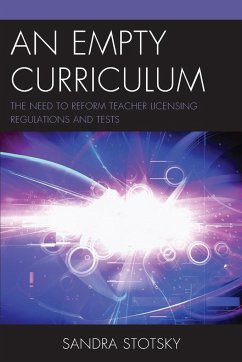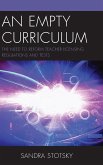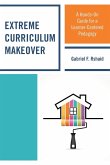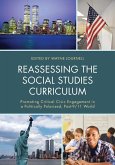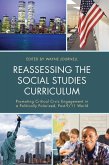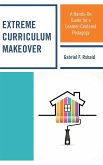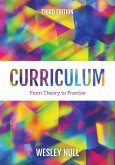- Broschiertes Buch
- Merkliste
- Auf die Merkliste
- Bewerten Bewerten
- Teilen
- Produkt teilen
- Produkterinnerung
- Produkterinnerung
Teachers cannot teach what they do not know. This country has tolerated a weak licensing system for prospective teachers for decades. This weak system has been accompanied by an increasingly emptier curriculum for most students, depriving them of the knowledge and skills needed for self-government. An Empty Curriculum: How Teacher Licensure Tests Lead to Empty Student Minds makes the case that the complete revision of the licensing system for prospective and veteran teachers in Massachusetts in 2000 and the construction of new or more demanding teacher licensing tests contributed significantly…mehr
Andere Kunden interessierten sich auch für
![Empty Curriculum Empty Curriculum]() Sandra StotskyEmpty Curriculum74,99 €
Sandra StotskyEmpty Curriculum74,99 €![Extreme Curriculum Makeover Extreme Curriculum Makeover]() Gabriel F. RshaidExtreme Curriculum Makeover52,99 €
Gabriel F. RshaidExtreme Curriculum Makeover52,99 €![Reassessing the Social Studies Curriculum Reassessing the Social Studies Curriculum]() Reassessing the Social Studies Curriculum43,99 €
Reassessing the Social Studies Curriculum43,99 €![Reassessing the Social Studies Curriculum Reassessing the Social Studies Curriculum]() Reassessing the Social Studies Curriculum79,99 €
Reassessing the Social Studies Curriculum79,99 €![Extreme Curriculum Makeover Extreme Curriculum Makeover]() Gabriel F. RshaidExtreme Curriculum Makeover97,99 €
Gabriel F. RshaidExtreme Curriculum Makeover97,99 €![Curriculum Curriculum]() Wesley NullCurriculum110,99 €
Wesley NullCurriculum110,99 €![Curriculum Curriculum]() Wesley NullCurriculum56,99 €
Wesley NullCurriculum56,99 €-
-
-
Teachers cannot teach what they do not know. This country has tolerated a weak licensing system for prospective teachers for decades. This weak system has been accompanied by an increasingly emptier curriculum for most students, depriving them of the knowledge and skills needed for self-government. An Empty Curriculum: How Teacher Licensure Tests Lead to Empty Student Minds makes the case that the complete revision of the licensing system for prospective and veteran teachers in Massachusetts in 2000 and the construction of new or more demanding teacher licensing tests contributed significantly to the Massachusetts "education miracle." That "miracle" consisted of enduring gains in achievement for students in all demographic groups and in all regional vocational/technical high schools since 2005-gains confirmed by tests independent of Massachusetts policy makers.
Produktdetails
- Produktdetails
- Verlag: Rowman & Littlefield Publishers
- Seitenzahl: 160
- Erscheinungstermin: 19. Februar 2015
- Englisch
- Abmessung: 229mm x 152mm x 9mm
- Gewicht: 242g
- ISBN-13: 9781475815672
- ISBN-10: 1475815670
- Artikelnr.: 41755566
- Herstellerkennzeichnung
- Libri GmbH
- Europaallee 1
- 36244 Bad Hersfeld
- gpsr@libri.de
- Verlag: Rowman & Littlefield Publishers
- Seitenzahl: 160
- Erscheinungstermin: 19. Februar 2015
- Englisch
- Abmessung: 229mm x 152mm x 9mm
- Gewicht: 242g
- ISBN-13: 9781475815672
- ISBN-10: 1475815670
- Artikelnr.: 41755566
- Herstellerkennzeichnung
- Libri GmbH
- Europaallee 1
- 36244 Bad Hersfeld
- gpsr@libri.de
Sandra Stotsky, professor of education emerita, University of Arkansas, was senior associate commissioner at the Massachusetts Department of Elementary and Secondary Education from 1999 to 2003, in charge of developing or revising K-12 standards in all major subjects, teacher and administrator licensing regulations, teacher licensure tests, and professional development criteria. She served on the Common Core Validation Committee from 2009 to 2010 but refused to sign off on these standards on the grounds that they were not (1) research-based, (2) internationally benchmarked, or (3) rigorous.
Contents
Preface: What Led to the Massachusetts "Education Miracle"?
1. Why We Know So Little about Teacher Licensing Tests
Overview
Problem
Sources of Information
Definition of Key Terms
2. Who Needs to be Licensed to Teach
Purpose for a License in Other Professions
Purpose for Licensing Teachers in Public Schools
Why a License Is Not Required for Teachers in Private Schools
Why a License Is Not Required for all Teachers in Charter Schools
3. About Teacher Licensing Tests
Organizations that Develop Teacher Licensing Tests
Types of Teacher Licensing Tests
Legal Basis for Teacher Licensing Tests
When Teacher Licensing Tests Are Taken
Meaning of Pass Scores
What We Know about the Content of Teacher Licensing Tests
4. History of Teacher Licensing Tests in the United States
Early Teacher Examinations
Teacher Tests in the Twentieth Century
Growing Influence of Teacher Educators after World War II
Rising Demand for Teacher Licensing Tests in the 1970s and 1980s
Congressional Requirement in 1998 of Licensing Tests for all Teachers
5. What Generates Topics on Subject Area Licensing Tests?
How the Content of Subject Area Licensing Tests May Be Designated
Reliance on a college major or minor.
Usefulness of a topic approach.
How Subject Area Licensure Tests Indirectly Shape the School Curriculum
6. Rationale for New and Revised Licenses in the Bay State
Licensure Tests for Foreign Language Teachers
Licensure Tests for Secondary Teachers of a Foreign Language
Licensure Tests for Elementary Teachers of a Foreign Language
Licensure Tests for Latin and Classical Humanities Teachers
Licensure Tests for Teachers of Young Students
Stand-Alone Licensure Tests of Reading Instructional Knowledge for Teachers
of Elementary-Age Children
Licensure Tests for Reading Specialists
Comparisons with other Licensure Tests for Elementary Teachers
Stand-Alone Licensure Tests of Reading Instructional Knowledge for
Pre-School Teachers
Licensure Tests for Teachers of Middle School Students
Licensure Tests for Middle School Teachers of Two Subjects
Licensure Tests for Middle School Teachers of a Single Subject
Licensure Tests for Mathematics Teachers
Licensure Tests for Full-Time Mathematics Teachers in the Elementary and
Middle School
Stand-Alone Licensure Tests of Mathematical Knowledge for Elementary School
Generalists
Licensure Tests for Science Teachers
Licensure Tests for Teachers of the Communication and Performing Arts
For Music Teachers
For Theater Teachers
For Dance Teachers
For Speech Teachers
For Visual Art Teachers
Licensure Tests for English Teachers
Licensure Tests for History Teachers
Licensure Tests for U.S. Government Teachers
7. Other Facets of a Teacher Licensing System to Strengthen
Undergraduate Majors
Academic Time on Task
Weeding Out Outdated Licenses
Grade Levels Covered by a License
Grade Levels and Practicum Hours for Student Teaching
Construction and Types of Test Items on Licensure Tests
8. Strengthening Veteran Teachers
Gradual Expansion of Required Credit Hours in Education Coursework
Required Coursework for a Master's Degree Program in EducationRequirements
for Professional Development
Concluding Remarks
9. Studies of Predictive Validity and Construct Validity
Examples of Studies on Predictive Validity
What Studies of Predictive Validity Tell Us
Studies of the Construct or Content Validity of Teacher Tests
What Studies of Construct or Content Validity Tell Us
10. Difficulties in Developing More Demanding Subject Area Licensure Tests
Anomaly of Teacher Licensure Tests
Claims about the Supply and Academic Quality of Prospective Teachers
Measure of Value-Added or Disciplinary Knowledge: Which is Preferable?
Procedural Obstacles
11. What State Legislators Probably Shouldn't Do
Fail to Ask for Stronger Quality Controls
Leave Academic Admission Standards Alone
Rely on Accreditation
Require States to Report Annually on Pass Rates
12. What Policy Makers and State Legislators Can Do
Ensure a Separate Licensing System for "Shop" Teachers
Require the Same Academic Admission Standards as Other Countries
Learn from Changes in the Bay State's Licensing System for Teachers
Some Specific Changes to Make
Above All, Require Qualified Curriculum Directors in K-12
Preface: What Led to the Massachusetts "Education Miracle"?
1. Why We Know So Little about Teacher Licensing Tests
Overview
Problem
Sources of Information
Definition of Key Terms
2. Who Needs to be Licensed to Teach
Purpose for a License in Other Professions
Purpose for Licensing Teachers in Public Schools
Why a License Is Not Required for Teachers in Private Schools
Why a License Is Not Required for all Teachers in Charter Schools
3. About Teacher Licensing Tests
Organizations that Develop Teacher Licensing Tests
Types of Teacher Licensing Tests
Legal Basis for Teacher Licensing Tests
When Teacher Licensing Tests Are Taken
Meaning of Pass Scores
What We Know about the Content of Teacher Licensing Tests
4. History of Teacher Licensing Tests in the United States
Early Teacher Examinations
Teacher Tests in the Twentieth Century
Growing Influence of Teacher Educators after World War II
Rising Demand for Teacher Licensing Tests in the 1970s and 1980s
Congressional Requirement in 1998 of Licensing Tests for all Teachers
5. What Generates Topics on Subject Area Licensing Tests?
How the Content of Subject Area Licensing Tests May Be Designated
Reliance on a college major or minor.
Usefulness of a topic approach.
How Subject Area Licensure Tests Indirectly Shape the School Curriculum
6. Rationale for New and Revised Licenses in the Bay State
Licensure Tests for Foreign Language Teachers
Licensure Tests for Secondary Teachers of a Foreign Language
Licensure Tests for Elementary Teachers of a Foreign Language
Licensure Tests for Latin and Classical Humanities Teachers
Licensure Tests for Teachers of Young Students
Stand-Alone Licensure Tests of Reading Instructional Knowledge for Teachers
of Elementary-Age Children
Licensure Tests for Reading Specialists
Comparisons with other Licensure Tests for Elementary Teachers
Stand-Alone Licensure Tests of Reading Instructional Knowledge for
Pre-School Teachers
Licensure Tests for Teachers of Middle School Students
Licensure Tests for Middle School Teachers of Two Subjects
Licensure Tests for Middle School Teachers of a Single Subject
Licensure Tests for Mathematics Teachers
Licensure Tests for Full-Time Mathematics Teachers in the Elementary and
Middle School
Stand-Alone Licensure Tests of Mathematical Knowledge for Elementary School
Generalists
Licensure Tests for Science Teachers
Licensure Tests for Teachers of the Communication and Performing Arts
For Music Teachers
For Theater Teachers
For Dance Teachers
For Speech Teachers
For Visual Art Teachers
Licensure Tests for English Teachers
Licensure Tests for History Teachers
Licensure Tests for U.S. Government Teachers
7. Other Facets of a Teacher Licensing System to Strengthen
Undergraduate Majors
Academic Time on Task
Weeding Out Outdated Licenses
Grade Levels Covered by a License
Grade Levels and Practicum Hours for Student Teaching
Construction and Types of Test Items on Licensure Tests
8. Strengthening Veteran Teachers
Gradual Expansion of Required Credit Hours in Education Coursework
Required Coursework for a Master's Degree Program in EducationRequirements
for Professional Development
Concluding Remarks
9. Studies of Predictive Validity and Construct Validity
Examples of Studies on Predictive Validity
What Studies of Predictive Validity Tell Us
Studies of the Construct or Content Validity of Teacher Tests
What Studies of Construct or Content Validity Tell Us
10. Difficulties in Developing More Demanding Subject Area Licensure Tests
Anomaly of Teacher Licensure Tests
Claims about the Supply and Academic Quality of Prospective Teachers
Measure of Value-Added or Disciplinary Knowledge: Which is Preferable?
Procedural Obstacles
11. What State Legislators Probably Shouldn't Do
Fail to Ask for Stronger Quality Controls
Leave Academic Admission Standards Alone
Rely on Accreditation
Require States to Report Annually on Pass Rates
12. What Policy Makers and State Legislators Can Do
Ensure a Separate Licensing System for "Shop" Teachers
Require the Same Academic Admission Standards as Other Countries
Learn from Changes in the Bay State's Licensing System for Teachers
Some Specific Changes to Make
Above All, Require Qualified Curriculum Directors in K-12
Contents
Preface: What Led to the Massachusetts "Education Miracle"?
1. Why We Know So Little about Teacher Licensing Tests
Overview
Problem
Sources of Information
Definition of Key Terms
2. Who Needs to be Licensed to Teach
Purpose for a License in Other Professions
Purpose for Licensing Teachers in Public Schools
Why a License Is Not Required for Teachers in Private Schools
Why a License Is Not Required for all Teachers in Charter Schools
3. About Teacher Licensing Tests
Organizations that Develop Teacher Licensing Tests
Types of Teacher Licensing Tests
Legal Basis for Teacher Licensing Tests
When Teacher Licensing Tests Are Taken
Meaning of Pass Scores
What We Know about the Content of Teacher Licensing Tests
4. History of Teacher Licensing Tests in the United States
Early Teacher Examinations
Teacher Tests in the Twentieth Century
Growing Influence of Teacher Educators after World War II
Rising Demand for Teacher Licensing Tests in the 1970s and 1980s
Congressional Requirement in 1998 of Licensing Tests for all Teachers
5. What Generates Topics on Subject Area Licensing Tests?
How the Content of Subject Area Licensing Tests May Be Designated
Reliance on a college major or minor.
Usefulness of a topic approach.
How Subject Area Licensure Tests Indirectly Shape the School Curriculum
6. Rationale for New and Revised Licenses in the Bay State
Licensure Tests for Foreign Language Teachers
Licensure Tests for Secondary Teachers of a Foreign Language
Licensure Tests for Elementary Teachers of a Foreign Language
Licensure Tests for Latin and Classical Humanities Teachers
Licensure Tests for Teachers of Young Students
Stand-Alone Licensure Tests of Reading Instructional Knowledge for Teachers
of Elementary-Age Children
Licensure Tests for Reading Specialists
Comparisons with other Licensure Tests for Elementary Teachers
Stand-Alone Licensure Tests of Reading Instructional Knowledge for
Pre-School Teachers
Licensure Tests for Teachers of Middle School Students
Licensure Tests for Middle School Teachers of Two Subjects
Licensure Tests for Middle School Teachers of a Single Subject
Licensure Tests for Mathematics Teachers
Licensure Tests for Full-Time Mathematics Teachers in the Elementary and
Middle School
Stand-Alone Licensure Tests of Mathematical Knowledge for Elementary School
Generalists
Licensure Tests for Science Teachers
Licensure Tests for Teachers of the Communication and Performing Arts
For Music Teachers
For Theater Teachers
For Dance Teachers
For Speech Teachers
For Visual Art Teachers
Licensure Tests for English Teachers
Licensure Tests for History Teachers
Licensure Tests for U.S. Government Teachers
7. Other Facets of a Teacher Licensing System to Strengthen
Undergraduate Majors
Academic Time on Task
Weeding Out Outdated Licenses
Grade Levels Covered by a License
Grade Levels and Practicum Hours for Student Teaching
Construction and Types of Test Items on Licensure Tests
8. Strengthening Veteran Teachers
Gradual Expansion of Required Credit Hours in Education Coursework
Required Coursework for a Master's Degree Program in EducationRequirements
for Professional Development
Concluding Remarks
9. Studies of Predictive Validity and Construct Validity
Examples of Studies on Predictive Validity
What Studies of Predictive Validity Tell Us
Studies of the Construct or Content Validity of Teacher Tests
What Studies of Construct or Content Validity Tell Us
10. Difficulties in Developing More Demanding Subject Area Licensure Tests
Anomaly of Teacher Licensure Tests
Claims about the Supply and Academic Quality of Prospective Teachers
Measure of Value-Added or Disciplinary Knowledge: Which is Preferable?
Procedural Obstacles
11. What State Legislators Probably Shouldn't Do
Fail to Ask for Stronger Quality Controls
Leave Academic Admission Standards Alone
Rely on Accreditation
Require States to Report Annually on Pass Rates
12. What Policy Makers and State Legislators Can Do
Ensure a Separate Licensing System for "Shop" Teachers
Require the Same Academic Admission Standards as Other Countries
Learn from Changes in the Bay State's Licensing System for Teachers
Some Specific Changes to Make
Above All, Require Qualified Curriculum Directors in K-12
Preface: What Led to the Massachusetts "Education Miracle"?
1. Why We Know So Little about Teacher Licensing Tests
Overview
Problem
Sources of Information
Definition of Key Terms
2. Who Needs to be Licensed to Teach
Purpose for a License in Other Professions
Purpose for Licensing Teachers in Public Schools
Why a License Is Not Required for Teachers in Private Schools
Why a License Is Not Required for all Teachers in Charter Schools
3. About Teacher Licensing Tests
Organizations that Develop Teacher Licensing Tests
Types of Teacher Licensing Tests
Legal Basis for Teacher Licensing Tests
When Teacher Licensing Tests Are Taken
Meaning of Pass Scores
What We Know about the Content of Teacher Licensing Tests
4. History of Teacher Licensing Tests in the United States
Early Teacher Examinations
Teacher Tests in the Twentieth Century
Growing Influence of Teacher Educators after World War II
Rising Demand for Teacher Licensing Tests in the 1970s and 1980s
Congressional Requirement in 1998 of Licensing Tests for all Teachers
5. What Generates Topics on Subject Area Licensing Tests?
How the Content of Subject Area Licensing Tests May Be Designated
Reliance on a college major or minor.
Usefulness of a topic approach.
How Subject Area Licensure Tests Indirectly Shape the School Curriculum
6. Rationale for New and Revised Licenses in the Bay State
Licensure Tests for Foreign Language Teachers
Licensure Tests for Secondary Teachers of a Foreign Language
Licensure Tests for Elementary Teachers of a Foreign Language
Licensure Tests for Latin and Classical Humanities Teachers
Licensure Tests for Teachers of Young Students
Stand-Alone Licensure Tests of Reading Instructional Knowledge for Teachers
of Elementary-Age Children
Licensure Tests for Reading Specialists
Comparisons with other Licensure Tests for Elementary Teachers
Stand-Alone Licensure Tests of Reading Instructional Knowledge for
Pre-School Teachers
Licensure Tests for Teachers of Middle School Students
Licensure Tests for Middle School Teachers of Two Subjects
Licensure Tests for Middle School Teachers of a Single Subject
Licensure Tests for Mathematics Teachers
Licensure Tests for Full-Time Mathematics Teachers in the Elementary and
Middle School
Stand-Alone Licensure Tests of Mathematical Knowledge for Elementary School
Generalists
Licensure Tests for Science Teachers
Licensure Tests for Teachers of the Communication and Performing Arts
For Music Teachers
For Theater Teachers
For Dance Teachers
For Speech Teachers
For Visual Art Teachers
Licensure Tests for English Teachers
Licensure Tests for History Teachers
Licensure Tests for U.S. Government Teachers
7. Other Facets of a Teacher Licensing System to Strengthen
Undergraduate Majors
Academic Time on Task
Weeding Out Outdated Licenses
Grade Levels Covered by a License
Grade Levels and Practicum Hours for Student Teaching
Construction and Types of Test Items on Licensure Tests
8. Strengthening Veteran Teachers
Gradual Expansion of Required Credit Hours in Education Coursework
Required Coursework for a Master's Degree Program in EducationRequirements
for Professional Development
Concluding Remarks
9. Studies of Predictive Validity and Construct Validity
Examples of Studies on Predictive Validity
What Studies of Predictive Validity Tell Us
Studies of the Construct or Content Validity of Teacher Tests
What Studies of Construct or Content Validity Tell Us
10. Difficulties in Developing More Demanding Subject Area Licensure Tests
Anomaly of Teacher Licensure Tests
Claims about the Supply and Academic Quality of Prospective Teachers
Measure of Value-Added or Disciplinary Knowledge: Which is Preferable?
Procedural Obstacles
11. What State Legislators Probably Shouldn't Do
Fail to Ask for Stronger Quality Controls
Leave Academic Admission Standards Alone
Rely on Accreditation
Require States to Report Annually on Pass Rates
12. What Policy Makers and State Legislators Can Do
Ensure a Separate Licensing System for "Shop" Teachers
Require the Same Academic Admission Standards as Other Countries
Learn from Changes in the Bay State's Licensing System for Teachers
Some Specific Changes to Make
Above All, Require Qualified Curriculum Directors in K-12

